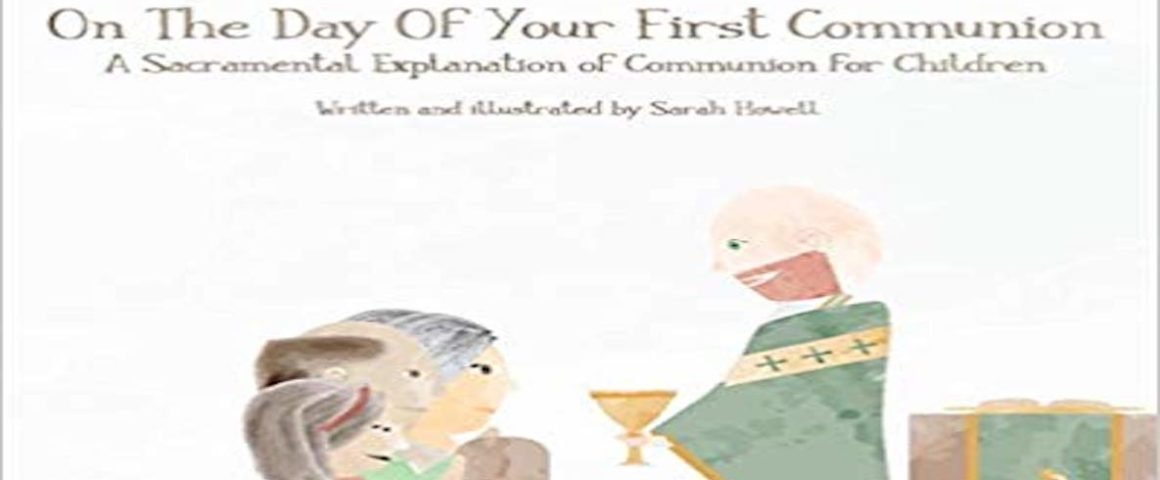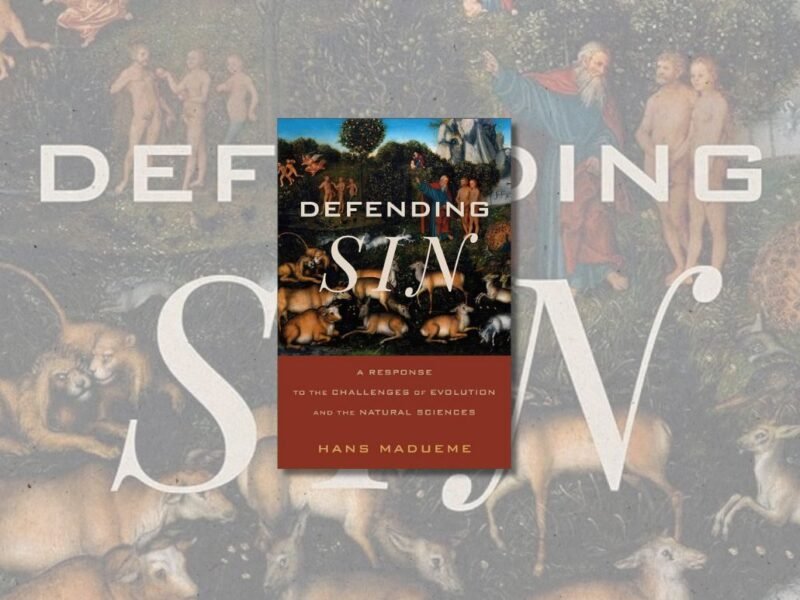One of the great flaws in the 20th century Church, especially in its Mainline and American expressions, was a lack of catechesis, particularly with children. The result has been a lack of retention accompanied by a rise in nominalism. This summer, I had the privilege of reviewing Sarah Howell’s children’s book On the Day You Were Baptized: A Sacramental Explanation of Baptism for Children. In the review, I mentioned that Howell’s book is a “trendsetter” and that “Personally, I’m looking forward to a follow up (perhaps about First Communion?).” Thank goodness my prayers have been answered as Howell has recently released On the Day of Your First Communion: A Sacramental Explanation of Communion for Children. The book is a fitting sequel to the original and a worthy addition to any children’s library.
The book does a wonderful job presenting Communion in a theological but approachable way. Eucharist is immediately connected to Baptism. Howell does an excellent job anchoring the baptized child’s identity in the Church: “You have been baptized into the body of Christ and marked as his own forever. Now it is time for you to join the Church family as we take the Eucharist.” This is the same strategy employed by the catechism in the Book of Common Prayer which is why we ask the child’s name and who gave it to them (a strategy which is markedly different from the other major catechisms). The book is refreshingly clear about what the Eucharist is, describing it as “a time where we all feast on the body and blood of Christ.” This places it in agreement with the witness of Scripture and the Church. Personally, my favorite aspect of the book is the way in which Howell connects the Old and New Testament. This is important because it provides a fuller understanding of Holy Communion while simultaneously modeling what good Bible reading looks like for children. She ties the Eucharist to the Passover Lamb, “Jesus is the perfect Lamb of God. Cleansing us through his blood, for us he was slain” (for more on this topic, see Brant Pitre’s Jesus and the Jewish Roots of the Eucharist: Unlocking the Secrets of the Last Supper).
To connect the topics, the reality of the sacrifice of the cross is a central component of the book:
Jesus took on Himself the terrible penalty that should have been ours to pay
We eat the bread and drink the wine to remember He washed all our sins away
Howell does a good job balancing the theological with the practical, providing the reader with expectations for the liturgy of First Communion (bonus points for including the priest facing ad orientem). The implications of the Eucharist are clearly laid out: “We hold our hands to receive the body and blood. Through these our sins He does heal…Taking communion, you participate in the real presence of Jesus each week.” The final portion of the book links the Eucharist to the eschatological hope embodied by the marriage feast of the Lamb in Revelation 19.
Overall, I find this entry in Howell’s catalog to be just as solid and necessary as the first. The art is wonderful (listeners of the podcast I co-host, The Sacramentalists, may be pleased to know the priest in the book is a depiction of Myles Hixson, the other co-host and Howell’s brother-in-law). The message is theologically sound, rooted in the catholic tradition of the Book of Common Prayer. It is presented in an accessible way that allows parents to introduce and teach their children about the sacramental faith.
I would like to address a review of Howell’s first book written by Daphne Preston-Kindle at In the Fourth Nocturn. Preston-Kindle takes some issues with the first book on Baptism which could probably be applied to the second as well. She argues that the book assumes the child has parents, grandparents, aunts, and uncles which may not be the case in every instance. Technically, she is right. However, far from being a negative, it can be a catalyst for encouraging the child to remember their own baptism. Parents or guardians can use these sections to tell the children who actually was present at the baptism (our son’s uncle was not present at his baptism but the book presents no real problem in this regard). There may be some instances where it could be problematic but it seems far from a widespread concern. The same is true for the other aspects of the critique: yes, the book assumes there is a font in the front of the church, a chrisom, triple suffusion, etc. Given the proliferation of “options” across traditions (or even within traditions, as the case may be), the book remains valuable. It is great insofar as it is specific. Where it is different than the particular baptism of the reader, it is an opportunity to discuss the differences. The same is true in the newer volume about the Eucharist.
On the Day of Your First Communion is a valuable tool. If you are a priest, buy this book to give to the first communicants (and the baptism book to give to the children you baptize). If you are a parent, then buy this for your children for their theological formation. I’m not sure what Sarah Howell’s next project will be, but I am sure it will not disappoint.







'On the Day of Your First Communion: Book Review' has 1 comment
February 24, 2020 @ 9:08 pm A reader
Not having read the book yet, it’s hard to be sure. But as presented in the review the book sounds like it has some excellent points (OT emphasis, the sacrifice of Christ) but also that it will cause unnecessary confusion, especially if it’s billed by the reviewer as being in continuity with the Book of Common Prayer (“rooted in the catholic tradition of the Book of Common Prayer”–presumably a reference to 1662, etc.). The 1662 BCP has a way to prepare for “first communion” (though that phrase is not a BCP one, and even the idea isn’t presented as having any significance). That way to prepare to be admitted to the Lord’s table is the BCP catechism and confirmation. And the catechism offers clear language to teach what is happening: an outward visible sign, an inward spiritual grace, and so on. And it connects that “strengthening and refreshing of our souls” to faithful reception–it teaches that Christ’s body and blood are “verily and indeed taken and received by the faithful in the Lord’s Supper.” It’s Article 29 put in catechetical form. And the catechism emphasizes the need for self-examination, repentance, faith, charity–all the standard themes of the BCP exhortations. It would be good for the reviewer to measure something that is meant to prepare a child for taking Communion–the traditional role of the catechism and confirmation–by the yardstick of the BCP catechism and confirmation, telling readers where it is similar and where it is different. Some readers may not want the sacramental theology of the BCP catechism and the Articles. Many readers of The North American Anglican will.